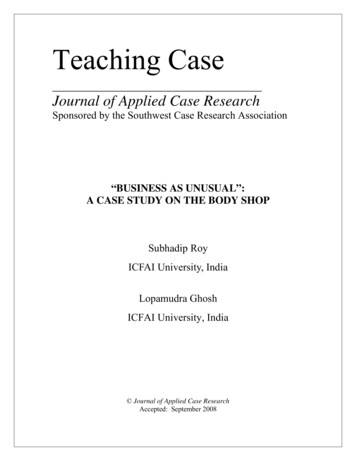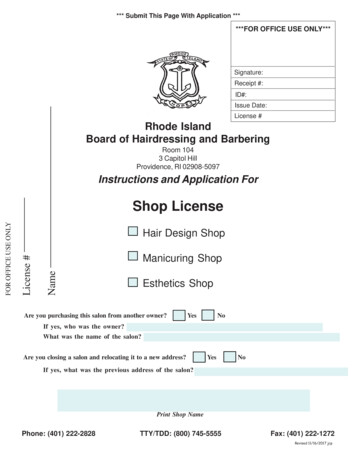
Transcription
THE BODY SHOP VALUES REPORT 2005
424446484850525557595963788083WelcomeWho we areGovernance and managementEthical policiesFunding for goodAgainst Animal TestingOpposing Animal Testing: an ongoing battleLabelling: Consumer information under threat?Stakeholder comment from BUAVConsumer safety vs animal testingSupport Community TradeCommunity Trade in focusStrengthening our Community Trade programmeActivate Self EsteemStop Violence in the Home -a positive message of empowermentStakeholder comment from a New Zealand store managerGlobal action with local partnersStakeholder comment from Women's AidImproving employee turnoverReawakening ValuesDefend Human RightsHuman Rights through the looking glassStakeholder comment from UNAIDSBuilding blocks of Ethical TradeLimits to Ethical TradeReporting on Human RightsProtect Our PlanetSustainable rain forests - In the palm of your hand?Stakeholder comment from WWFInspired by natureTurn out the lights to protect the planetSustainable wood sourcingAssuranceAssurance statement from URS VerificationGRI indicators & UN NormsAbout this reportIndicators and targetsGlossary
Welcome2005 is a landmark year for The Body Shop Internationalas after three years of hard work in strengtheningbusiness processes and profitability, we are now focusingon expanding the brand across the world with a 100million investment plan. These expansion plans havebeen supported by a repositioning of the brand to themasstige consumer sector (between mass and prestige inthe cosmetics market).This has required a new brand identity, productinnovation, a new shop design, the development of amulti-channel service (The Body Shop at Home and ecommerce) and compelling values campaigns to ensurewe better meet our customers’ needs now and in thefuture. This repositioning has been underpinned by ourcommitment to the wellbeing of our fellow humans andthe preservation of the planet which is outlined in this2005 Values Report.There has been much successful progress on our Values thisyear. Our new branding incorporates "Passion Panels", whichtell customers the stories behind our ingredients and ourproducts. Our campaign to 'Stop Violence in the Home' is nowmaking a real difference in 26 markets, and we've collectedsignificant funds globally to support Tsunami disaster victimsand promote HIV/AIDS awareness and research. We'vefocused our efforts on increasing internal communication ofour values, through training and engagement within thebusiness, and have improved our programmes to supportCommunity Trade and to secure higher labour standards inour supply chain.
The Values Report 20052004 also saw a return to sustainability reporting, with thecompletion of our first reporting cycle since 1997. OurIndividual Stakeholder Accounts mapped out issues andchallenges relating to investors, suppliers, employees,franchisees, customers and the environment.This 2005 Values Report marks a new frontier in our reporting.This report is about the future, not the past. It focuses on thechallenges facing us as a values-based company. Weunderstand that values are never static, being constantlychallenged by new legislation, market developments, socialchange, even advances in science and technology. This reportis not a comprehensive mapping or overview of our Valuesactivities, but an account of the key risks and opportunitiesfacing us over the coming years, and the action we are takingto address them.Listening to stakeholdersOur engagement with stakeholders provides us with valuableideas for improvements and on-the-ground knowledge ofemerging issues. We listen to Non GovernmentalOrganisations, business networks, franchisees, employees,communities, suppliers and investors to understand where wecan help make a difference. For this report, we have invitedfive stakeholders to comment on the role of The Body Shop,on business in general and on some of the global community'sgreatest challenges, such as HIV/AIDS, tropical deforestation,domestic violence, animal testing and economic developmentof the poorest communities.Earning trustIt is important to us to provide credible responses to thesechallenges and other emerging issues. Walking the talk,running our business with integrity and delivering against ourpromises are key to maintaining the trust of all ourstakeholders. This report incorporates an independentassurance statement, and has been developed in parallel withan extensive assurance programme. The programme wasdesigned not only to verify data accuracy and the truthfulnessof this report, but also to assess the effectiveness of ourinternal processes in supporting our values in everything wedo.It is our hope that you will find that this report gives an honestand balanced account of the complexities and challenges weface and the extensive work we do to ensure that we canprovide the best products, while continuing to support thecommunities in which we operate and uphold our promise tobe a responsible corporate citizen.Steve McIvorDirector of ValuesPeter SaundersChief Executive Officer
Who we areThe Body Shop International plc is a high quality skin andbody care retailer operating in 52 markets with 2,045stores, spanning 25 languages and 12 time zones. Wehave one of the most recognisable brands in the worldand have an established reputation as a socially andenvironmentally responsible company.The Body Shop is listed on the London Stock Exchange. Ourtotal retail sales in 2004/2005 across all The Body Shopoutlets amounted to 708.7 million (2003: 672.5 million).Group turnover was 419 million, up 10 % from the previousyear, and profit before tax increased by 21% to 34.5How we operateOur business consists of a combination of company-ownedand franchised markets, and a developing multi-channelservice with our direct selling organization –The Body Shop at Home and online retail in the US. Weemploy directly 6788 people, with approximately 14,000additional employees working within our franchise networkand as consultants in The Body Shop at Home and onlineretail in the US.We source the majority of products and accessories fromsuppliers, who we screen under our Ethical Trade programme,and from our Community Trade suppliers. Our solemanufacturing operation is Soapworks, a 100-strong factory inGlasgow.What we sellFamous for creating a niche market sector for naturallyinspired products, The Body Shop has introduced a generationof consumers to the benefits of a wide range of best sellers,from Vitamin E Moisture Cream to the Kinetin* range and the
Body Butter range.It is estimated that The Body Shop sells a product every 0.5seconds. Annually, we generate over 69 million customertransactions through stores worldwide and our current rangeoffers more than 900 products and 200 accessories.*Patented technology used under license from Senetec plcIf you want to know more:The Body Shop Annual Report 2005
Governance and managementThe Body Shop Board of Directors is responsible forcorporate governance in compliance with London StockExchange regulations and UK company law, as well asrepresenting the interests of shareholders and monitoringcompliance with formal company policies, includingethical policy.The Board meets formally six times a year and is responsibleamongst other things for strategy, allocation of financialresources, annual and interim results, acquisitions anddisposals and risk management. For each formal meeting, theBoard reviews how the Company has performed against itsValues.Board compositionThe Board is currently composed of seven members. Thereare five non-executive directors, three of whom are consideredto be independent. The two founders of The Body Shop, Anitaand Gordon Roddick, are non-executive directors.The Board comprises of nationals from the UK, the US,Canada and the Netherlands and all directors have extensiveBoard and management experience from the retail andconsumer goods sectors.Board committeesThere are two formal committees, an Audit Committee of threeindependent non-executive directors and a Remuneration andNominations Committee, which includes four members, threeof whom are independent.Apart from the formal Board committees, the Chairman headsa Risk Committee which includes the Director of Finance, IT
and Supply Chain as well as the Head of Internal Audit. ThisCommittee monitors key company risks, includingenvironmental and social performance, compliance withpolicies and reputational issues. The Risk Committee reportsto the Board throughout the year.Executive CommitteeManagement of our operations is delegated to the members ofthe Executive Committee, which comprises of 12 seniormanagers and the CEO.Responsibility for managing The Body Shop corporateresponsibility performance ultimately lies with the CEO.However, individual Executive Committee members arecharged with ensuring that our values are adhered to withintheir area of responsibility. There is a dedicated Director ofValues, who is responsible for our campaigns and advocacywork, development of ethical policies and public reporting onour values.If you want to know more:The Body Shop Annual Report 2005
Ethical policiesAt the heart of The Body Shop lies our Mission Statementand our Trading Charter. These fundamental principlesoutline our commitment to the pursuit of social andenvironmental change, meaningful contribution to thecommunities in which we operate, and our work towardssustainable development, meeting the needs of thepresent without compromising the future.Over the years, these principles have been further refined inour ethical policies, which shape how we manage ourbusiness. In addition, we have developed an extensive systemof guidelines for our functional teams to ensure that ourprinciples are made practical.For example, our materials guidelines, which are used inproduct development and as specifications for suppliers,include questions on the source of natural sponges, therecyclability of glass, the origin of wax, the certification statusof paper and cardboard and dozens of similar issues.Equally, our approval procedure for suppliers and many otherbusiness processes are accompanied by strong ethical criteriato ensure that our values are adhered to in everything we do.A list of our core ethical policies is available in our on-linereport l/library.jsp)Franchisees are required to live up to the values of The BodyShop as described in our Mission Statement and TradingCharter. They are also obliged to follow those policies that aredirectly relevant to retailers, for example, our EnvironmentalPolicy and our Human Rights Principles.The Risk Committee, which includes our Chairman, Director ofFinance, and Head of Internal Audit, oversees compliance withcompany policies and reports to the Board of Directors on any
risks of non-compliance.Naturally, our ethical policy system requires periodic updatingto reflect the development of the business and to address newissues raised by our stakeholders. In 2004, for example, a newpolicy on the use of chemicals in consumer products wassigned off by our Chairman and CEO, and our position onsustainable palm oil was published to signpost our status onthese issues.In 2005, we will review all of our core ethical policies to ensurethat they are still relevant to our priorities, activities andstructure as well as stakeholder expectations. In particular, wewill clarify the extent to which our franchisees are expected toadhere to our core Values policies.
Funding for goodThe Body Shop is committed to allocating a share of ourprofits to charities around the world. In 2004, The BodyShop was recognised by Business in the Community forour significant charitable contributions. We support awide range of charities and communities directly throughvolunteering, cash and product donations. The majority ofcharitable donations are channelled through The BodyShop Foundation, founded in 1989 as a way ofdistributing funds from The Body Shop International plc.and its extended family.In the financial year 2004-2005, The Body Shop donatednearly 3.6% ( 1.3 million) of our pre-tax profits to charity. Inresponse to the terrible tragedy caused by the Asian Tsunami,we donated 100,000 to the Disaster Emergency Committee.A further 200,000 was raised through the generouscontributions of customers in our stores around the world.Subsequently, we have pledged an additional 100,000 to thecharity Children on the Edge to help their work in rebuildingthe lives of children in Aceh, the Indonesian province worst hitby the disaster.In addition to our corporate donations, our customers helpedus to raise over 500,000 through our global ‘Stop Violence inthe Home’ campaign during the last year. The Americas regionalso supported vital work on HIV/AIDS, carried out by the ‘UntilThere’s A Cure’ campaign, with stores in the United Statesand Canada raising 300,000 through the sale of bracelets.The Europe, Middle East and Africa regions supported WorldAIDS Day 2004 through the sale of red ribbons in eightmarkets, raising 38,000 (about 26,000) for two projects inSouth Africa.
The Body Shop International donated 0.7 million to The BodyShop Foundation. In order to make most effective use of theavailable grant funds, each year the Board of Trustees of theFoundation decide on a specific focus within their overallmission statement. The focus takes into account current globalissues and existing commitments to core projects. The currentfocus of Trustees is to help stop violence in the home andsupport work around the issue of child sex abuse.In the coming year The Body Shop Foundation will also beworking closely with our regional offices to set up “LocalFunds”. These will develop and increase the capacity of localfundraising and grant-making initiatives in the many countrieswe operate in.To learn more:The Body Shop Foundation
Opposing Animal Testing: an ongoingbattleThe Body Shop is renowned for its stance Against AnimalTesting of cosmetics. Over the years we have been aleader in challenging the use of animals to test cosmeticproducts and ingredients. We successfully campaignedwith animal protection groups to change UK andEuropean laws and supported the development of nonanimal test alternatives. We are also among a fewcompanies who comply with the stringent requirements ofthe internationally recognised Humane CosmeticsStandard that is operated and endorsed by leading animalprotection groups in Europe and the United States.Against Animal TestingDue to the strong public backlash, combined with campaigningby organisations like The Body Shop, in the 1980 and 90’scompanies significantly reduced or ended their use of animalsin cosmetics tests. The testing of finished products has seen aparticularly dramatic decline and many governments haveimplemented complete test bans. In addition, considerablefunding has been invested into developing alternative ‘invitro’ (test-tube) tests, and these are increasingly being usedto replace animal testing. However, there are pressures toincrease animal testing in related areas such as the testing ofchemicals under new EU proposals. Many of these chemicalswill be used in a range of industries including cosmetics.Government actionIn 1998, the United Kingdom effectively ended cosmetictesting by refusing to issue or renew any animal testinglicences for cosmetic purposes.During 2002, in the 7th Amendment to its Cosmetics Directive,
the European Union agreed to ban the sale or marketing, from2009, of cosmetics tested on animals. A complete ban oncosmetic ingredients being tested on animals will beintroduced by 2013 (or sooner, if alternative non-animal testsare developed and validated).In the United States, the Food and Drug Administration (FDA)has no explicit animal testing requirements for finishedcosmetics products. However, the agency has historicallyused animal toxicity data as its de facto standard to settlesafety issues. Similarly, many companies have historically feltthat the only way to obtain information to assure the safety ofworkers and consumers and satisfy regulatory expectations isthrough testing on animals.In Japan requirements on safety testing and data are similar tothose in the European Union. The harmonisation mainlyconcerns cosmetic ingredients that are regulated in Japanaccording to similar principles to those in the European Union:negative list of prohibited substances, positive lists ofauthorised UV filters, colours and preservatives, restrictive listof substances that must satisfy specific conditions. Within thescope of the general safety requirement for cosmetic productsa cosmetic manufacturer may, on his own responsibility, useessentially any raw material as a cosmetic ingredient andmarket the product without approval.Testing todayMany consumers mistakenly believe that the testing ofcosmetics on animals has been banned. The reality, accordingto the Royal Society for the Prevention of Cruelty to Animals,is that around 38,000 animals continue to be used in suchtests across Europe, and many more globally. Today theoverwhelming majority of these tests are carried out oningredients, rather than finished products.As an international company, The Body Shop has to carefullyscreen all of our ingredients and suppliers, and work to ensurethat we do not breach our promise to customers to avoidanimal testing.If you want to know more:The Body Shop ‘Against Animal Testing’ PolicyHumane Cosmetics y.html)
Labelling: Consumer information underthreat?Opinion polls show that animal testing of cosmetics is anissue of strong concern amongst consumers in manycountries. Despite consumer pressure and mediacoverage animal protection groups point to the fact thatwithin the European Union (EU) alone tens of thousandsof animals are still used in cosmetics tests every year.The Body Shop has continued to use the ‘Against AnimalTesting’ statement on our product labels to maintainawareness of the issue. However, such claims have beenthreatened under a proposal from the EuropeanCommission that was, ironically, originally designed tohelp consumers identify products that were not animaltested.What does The Body Shop intend to do about thispotentially damaging legislation?One aspect of the 7th Amendment to the Cosmetics Directivethat regulates the sale, marketing and safety of cosmetics inthe European Union was a requirement that cosmeticscompanies could only make ‘no animal testing’ claims onpackaging if they met set criteria. The European Commissionhas tried to assert that to claim that no animal tests have beencarried out would require that the finished product and itsingredients have never been tested on animals.However, the reality is that most of the ingredients used incosmetic and toiletry products have been animal tested forsome purpose, by someone, at some time in their history. Itwould therefore be impossible for companies to make any ‘noanimal testing’ claim regardless of the policy or practiceoperated by the company. This is both unreasonable andunfair to ‘non-animal testing’ companies, animal welfaregroups and the consumer. The real challenge is in developing
guidelines that acknowledge the complexity of the issue whileensuring that claims made by companies are meaningful,reasonable, endorsed by leading animal welfare groups andexplained clearly to consumers through the provision ofinformation in-store.What Against Animal Testing meansThe Body Shop has never tested or commissioned testing ofits ingredients or products on animals. We also placerestrictions on our suppliers' use of animal tests by refusing tobuy any ingredient that has been tested on animals forcosmetic purposes after the 31st December 1990.We do not make a statement on our products with respect toanimal testing of either the product or its ingredients. Insteadwe make a statement that reflects our corporate philosophy,which is ‘Against Animal Testing’. It is our view that, contraryto the original intent, the European Commission’s amendeddirective is acting to prohibit companies who are opposed toanimal testing from making any statement on their products, orin stores, that differentiates them from companies thatcontinue to animal test.We believe that if this legislation were fully implemented,consumers would be deprived of the right to choose productsfrom companies that avoid animal testing. To prevent such anoutcome, we have engaged with UK and EU authorities, aswell as animal protection groups, to ensure a balance isachieved between providing transparent and honest consumerinformation, and meeting the realistic ‘no animal testing’requirements expected from companies opposed to animaltesting.
Stakeholder comment from BUAVEven though there has been a voluntary ban since 1998 inthe UK on animal testing for cosmetics, it has taken morethan 20 years of relentless and high profile campaigningfrom consumers, animal rights organisations and ethicalcompanies for the EU to finally ban animal testing forcosmetics and toiletries. But buyer beware: animal testedbeauty products will remain on the shelves of UK andEuropean shops for years to come.With the launch in 1973 of a ground-breaking campaign fromthe BUAV (British Union for the Abolition of Vivisection), theshocking cruelty of cosmetics animal testing was for the firsttime brought to the attention of the public. Disturbed byimages of laboratory animals with swollen eyes and raw andbleeding skin, a new generation of ethical consumers began toboycott animal tested products and demand that such testingwas banned. Since then, the BUAV has campaigned tirelessly,with the support of a growing number of ethical companies, tobring about an end to animal testing in the cosmetics industry.In 1998, as part of this international campaign, the BUAV andpartner organisations in the European Coalition to End AnimalExperiments launched the Humane Cosmetics Standard(HCS), the first, and still the only internationally recognisedscheme for cosmetics and toiletries that are not tested onanimals. The Body Shop was one of the first leading cosmeticmanufacturers to sign up to the HCS and to this day continuesto support the international campaign against cosmeticsanimal testing. In July 2005, for example, consumers wereinvited to contact The Body Shop to arrange free cruelty-freemakeovers during the BUAV’s 3rd National Cruelty-FreeWeek. Additionally, The Body Shop Foundation has helped tofund some of the BUAV’s key campaigns, including providingsupport to help build a sanctuary for rescued ex-laboratorymonkeys in Thailand.
January 2003 heralded a major victory in the campaign whena Europe-wide ‘testing and sale’ ban was finally agreed andpassed into European law. However, there remain frustratinglylong deadlines before the legislation takes effect. Althoughdelighted that the EU has finally agreed to ban cosmeticsanimal testing there remains much still to do, both in Europeand worldwide. With support from ethical companies likeThe Body Shop, the BUAV faces these continuing challengeswith unending commitment and renewed hope for the animals.For more information on the BUAV’s cruelty-free campaigns,please visit:www.buav.org/gocrueltyfreeLauren BatesCorporate Relations ManagerBritish Union for the Abolition of Vivisection
Consumer safety vs animal testingRegulators in many countries, most notably in theEuropean Union (EU), are pushing through tougherrequirements on the safety information expected onwidely used chemicals. These are materials that are usedin a range of applications including the production ofcosmetics and toiletries. Much of the new data will begenerated through animal tests, potentially compromisingthe ability of companies to continue buying ingredientsthat meet ‘Against Animal Testing’ standards.Where does The Body Shop stand on this issue?The European Commission which advises and formulatesregulatory changes in the EU is currently working on a newsystem for regulating the use of chemicals - this is known asREACH: the Registration, Evaluation and Authorisation ofChemicals. The main aim of REACH is to give the chemicalsindustry responsibility for evaluating the safety of substancesand how any risks to humans or the environment can besatisfactorily managed. It is anticipated that REACH could beput into practice by 2007.REACH aims to harmonise the regulation of chemicals in theEU, so that ‘existing’ and ‘new’ chemical substances aresubjected to the same safety assessment. ‘Existing’ chemicalsmake up around 99% of those currently on the market, andmany are believed to lack essential safety data raising thepossibility that they could be harmful to humans and theenvironment. REACH advocates the use of non animal testingas far as possible but only a small number of alternativemethods have been validated and accepted for regulatorytesting. Very large numbers of laboratory animals aretherefore likely to be subject to tests if the proposed legislationis enacted in its current form.
A recent Commission report reviewed the 30,000 chemicalsfor which further testing is likely to be necessary, andestimated that in the decade following implementationbetween 2 and 4 million animals would be used.Safety for people and animalsAt The Body Shop, the safety of our products is of paramountimportance. We have listened carefully to stakeholderconcerns about the safety of chemicals, and in a limitednumber of cases we have implemented policies either to banor phase out ingredients from our products (see Protect ourPlanet for further information on our chemicals strategy). Wetherefore welcome the REACH goal to improve consumer andenvironmental protection, but have grave concerns about theanticipated programme of animal testing that is likely to takeplace. The Body Shop supports initiatives that will reduceanimal testing, such as the development and validation of invitro (test tube) tests and computer modelling. If genuineconcerns exist about the safety of some chemicals we wouldsupport their withdrawal from the market.
Community Trade in focusThe Body Shop Community Trade (CT) programme makesa positive economic and social difference in marginalisedcommunities around the world. The programme is aboutpaying a fair price for goods and fair wages for labour. Inaddition, it is about supporting sustainable communitydevelopment projects in the producers’ communities. Inreturn we get great natural ingredients and accessoriesthat support The Body Shop brand.Through our Community Trade programme, over 10,000people receive a fair living wage for their work. Although nonquantifiable, the number of people whom we indirectly touchwill be far higher.In addition to fair wages and prices, Community TradeGuidelines ensure that our producers’ communities get themaximum benefit, that the environment is protected, and thatappropriate health and safety standards are applied. Throughour CT Guidelines we ensure that all five of our core valuesare addressed at once: Community Trade, Self Esteem,Protect the Planet, Human Rights and Against Animal Testing.Examples of projects we currently promote through trade, inaddition to the living wage we pay, include:
Malaria preventionWater and SanitationDrug RehabilitationHIV/AIDS AwarenessPreserving CultureSustainable Organic FarmingPreserving Family FarmsEducationWomen's RightsEradication of child LabourCommunity CentresDomestic ViolenceAmazon Coop (Brazilian Amazon, Brazil Nut Oil), Northwestern Bee Products (Zambia, Honey and Beeswax)Tungteiya (Ghana, Shea Butter), Amazon CoopAltai Price Batch (Russia, File-a-foot)Teddy (India, Accessories), GPI (Nepal, gift boxes)Bunjurn (Australia, Tea Tree), Santa Ana Pueblo (USA,Blue Corn)Capanema (Southern Brazil, Soya Oil), Coppalj (Brazil,Babassu oil), Candela (Peruvian Amazon, Brazil Nut Oil)NEO (UK, Cammomile), CJFPS (Nicaragua, Sesame Oil),CapanemaPoligano, (Honduras Loofahs), Tara, (India, Gifts andAccessories) GPI, Amazon Coop, Tungteiya, Teddy,Price BatchDhaka, Corr the Jute, CoppaljTaraCoppalj, CapanemaCoppaljCustomer-driven sustainabilityThe objective of our Community Trade programme is to helpcommunities establish a sustainable livelihood. This requires acareful balance between guaranteeing a sustainable level ofbusiness - i.e. sufficient to alleviate hardship - while notsourcing so much that suppliers are unable to cope. Ourproduct development process involves checkpoints andmilestones to ensure that, wherever possible, CommunityTrade is designed into our product ranges from the outset.Importantly, we work in a way that focuses on both stabilityand sustainability; stability in the levels of ordering andsustainability in community development.Key to the design of the programme is that we start with whatour customers will buy. Community Trade is not charity - wehave to know that Community Trade products will sell. Also,while Community Trade is about developing long-termrelationships, we cannot guarantee demand for life. Wetherefore monitor our Community Trade suppliers’ financialdependency on orders from The Body Shop, and provideforecasts to allow the suppliers to plan ahead. We advisewhere we believe dependency to be an issue, and support ourCT suppliers’ efforts to gain access to other markets and othercustomers.Being a customer-driven programme presents its ownchallenges from time to time. Our Community Trade suppliersare not always able to keep up with the rapidly changingtrends in the market-place, despite our efforts to support andguide them. This is especially the case in gifts andaccessories (G&A) where trends are seasonal and where oneseason differs greatly from another.For the financial year ending February 2005, The Body Shoponce again spent over 5m on our Community Tradeprogramme. In comparison to the previous year there was aslight fall ( 5.16m, down from 5.23m), yet we are happy toreport
The Body Shop is listed on the London Stock Exchange. Our total retail sales in 2004/2005 across all The Body Shop outlets amounted to 708.7 million (2003: 672.5 million). Group turnover was 419 million, up 10 % from the previous year, and profit before tax increased by 21% to 34.5 How we operate










